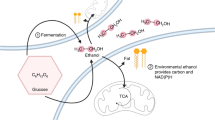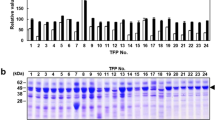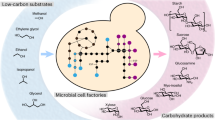Abstract
IN their fundamental researches, Warburg and his co-workers1 have described in detail the enzymatic oxidation of glucosemonophosphate to phosphogluconic acid. Furthermore, they found that the oxidation product is easily fermented by yeast macerate. Now, phosphogluconic acid might be a first product of carbohydrate oxidation occurring in a manner different from fermentative breakdown. Then the breakdown of phosphogluconic acid effected by yeast extract might represent a further step in the course of oxidation.
This is a preview of subscription content, access via your institution
Access options
Subscribe to this journal
Receive 51 print issues and online access
$199.00 per year
only $3.90 per issue
Buy this article
- Purchase on Springer Link
- Instant access to full article PDF
Prices may be subject to local taxes which are calculated during checkout
Similar content being viewed by others
References
Warburg, Christian und Griese, Biochem. Z., 282, 157 (1935).
Robison and King, Biochem. J., 25, 323 (1931).
Bernhauer und Görlich, Biochem. Z., 280, 367 (1935).
Author information
Authors and Affiliations
Rights and permissions
About this article
Cite this article
LIPMANN, F. Fermentation of Phosphogluconic Acid. Nature 138, 588–589 (1936). https://doi.org/10.1038/138588a0
Issue Date:
DOI: https://doi.org/10.1038/138588a0
This article is cited by
-
Transaldolase: A model for studies of isoenzymes and half-site enzymes
Molecular and Cellular Biochemistry (1973)
-
Organic constituents of the carbonaceous chondrites
Space Science Reviews (1963)
-
Phenothiazine derivatives as inhibitors of the glucose oxidative pathway in human erythrocytes
Experientia (1959)
Comments
By submitting a comment you agree to abide by our Terms and Community Guidelines. If you find something abusive or that does not comply with our terms or guidelines please flag it as inappropriate.



